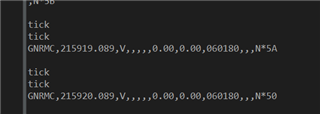Thread:sysconfig中讨论的其它部件
回波低延迟传输示例共享一种暂停代码和侦听UART缓冲区上的消息的方法,并在用户键入时回显这些消息。
echo回调代码示例共享了一种暂停整个代码并等待预期消息返回的方法。
对于期望在任何给定时间接收RX消息,同时运行其他流程的实用系统,您有什么建议。 我尝试通过删除信号暂停来调整回调示例,但它似乎从未触发读回调。 我还尝试调整低延迟传输示例,但它存在一个问题,即暂停代码等待某个字符,而不是在中断中接收到该字符时对该字符执行某些操作。
在其他微控制器上,我通过在UART上使用ISR触发器实现了我想要的功能, 在这个函数中,它只是读取接收到的char并根据它执行逻辑,但我仍然经常对FreeRTOS如何与CCS的sysconfig结构结合使用感到困惑。 是否对设置/方法有任何建议? 我基本上只想让ISR告诉我它收到了什么CHAR,而不会妨碍代码。


